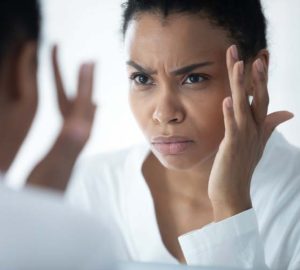eye twitch
What: Called myokymia in medical circles, these little twitches can be caused by stress, tiredness, eye strain, alcohol, caffeine and nutritional deficiencies.
Conventional cure: More chronic forms of the condition can be treated with facial injections to cause localized paralysis around the affected area, and surgery to remove muscles around the eyelids.
Home remedy: The very best antidote may be a good night’s sleep (eight hours or more). But because potassium, zinc and magnesium are key to muscle health, some say eating a banana (rich in potassium and zinc) can help. Other possible solutions: a cool compress with a few drops of rose water, or slices of cucumber placed over the eye.
stiff neck
What: According to the Cleveland Clinic, a stiff neck is the result of muscles weakening over time because of misuse. The CDC blames smart phone and computer use for the prevalence of neck pain. Staring at screens day after day can result in displaced neck joints.
Conventional cure: Over-the-counter medications like ibuprofen or acetaminophen can ease discomfort.
Home remedy: Pay attention to your sleeping position. Use a special neck pillow, or no pillow at all, and never sleep on your stomach. Practice regular stretching: roll shoulders backwards and down; squeeze shoulder blades together; and bring ears to shoulders—do each 10 times.
swollen feet
What: Swollen feet (edema) usually occur when the body is having to fight gravity to move blood and other fluids back up the legs. They are not often cause for concern, although, according to WebMD, when feet stay swollen for long periods, it could indicate other health problems like heart, liver or kidney disease.
Conventional cure: Treatment depends on the underlying cause.
Home remedy: For many people, simply raising the feet above the heart will reduce or eliminate the swelling. Hydrotherapy—alternating between cold and warm water—can be a very effective measure for reducing swelling. Meanwhile, the diuretic properties of dandelion and ginger in tea form also can be beneficial, and drinking lemon water helps flush toxins away as well. (Mix 2T lemon juice in a cup of warm water and sweeten with honey.)
warts
What: Common warts are small, grainy skin growths caused by a virus, and are usually on the hands or base of the feet.
Conventional cure: Warts may be frozen off with a cryotherapy kit like Dr. Scholl’s Freeze Away, lasered off in a doctor’s office or treated at home with salicylic acid.
Home remedy: Certain old wives’ tales suggested a wart could be soaked away in potions containing the juice of milkweed, radishes, marigold seeds and limes. Dandelion sap, cinnamon powder, caster oil, potato peelings and boiled potato water were also all thought to be cures. The latest solution? Cover it with duct tape for one to two months.
watery eyes
What: Watery eyes, or epiphora, produce tears excessively. They may occur when aging skin around the eye sags away from the eyeball, but also by allergies, common colds, blocked tear ducts and infections like conjunctivitis.
Conventional cure: A doctor can prescribe a common antihistamine if watering is due to an allergic reaction, or an antibiotic if it is the result of an infection. A counter-intuitive solution may be eye drops or artificial tears, which lubricate the eye and reduce wateriness that may be the result of dryness.
Home remedy: Soak cotton pads in a solution of rose water and a few drops of diluted honey and place over eyes. Or, if the tearing is accompanied by a burning sensation, place two spoons in the freezer for a while and then place over the eyes for instant relief. Eat your carrots!
dandruff
What: According to WebMD, dandruff is caused when the scalp sheds skin cells faster than normal. The fungus pityrosporum ovale, present on most people’s skin but aggravating only to some, can accelerate this shedding. Stress can increase dandruff, and so can poor diet.
Conventional Cure: Wash hair daily with an over-the-counter dandruff shampoo, leaving shampoo on for at least five minutes.
Home remedy: The People’s Pharmacy recommends Sea Breeze, an acne astringent, which contains eucalyptus leaf oil and alcohol and can be rinsed through hair a couple of times a week.
cold sores
What: Herpes labialis is an infection caused by the herpes simplex virus. The sores typically heal within three weeks, but the virus remains dormant in the facial nerve branches, leading to recurring infections in the future.
Conventional cure: Most heal on their own, but certain nonprescription ointments (Orajel or Anbesol) can speed healing and help with discomfort.
Home remedy: These sores can be caused by stress and may be helped by deep breathing exercises and meditation. According to the People’s Pharmacy, drinking buttermilk can help, and applying lemon balm topically to the area is a common European remedy.
ear ringing
What: Tinnitus affects 50 million people in the U.S. and is caused by damaged hair cells in the inner ear sending continuous electrical bursts to the auditory nerve. Ringing sometimes can be traced to high blood pressure.
Conventional cure: Low doses of anti-anxiety drugs have helped reduce tinnitus, and some small studies have shown that a hormone called misoprostol may be helpful in some cases.
Home remedy: Limit salt and aspirin (which can damage hair cells), and chemical stimulants in food and drinks, which can excite cells. Reduce caffeine, get plenty of rest and try playing low, enjoyable music to ‘drown out’ the internal sounds.
heartburn
What: Heartburn, a burning sensation in the central chest or upper abdomen, occurs when stomach acid backs up into the esophagus.
Conventional cure: Acid-blocking proton pump inhibitor (PPI) drugs like Prevacid and Nexium can be prescribed, but certain studies suggest these drugs might increase a senior’s risk of dementia.
Home remedy: Avoid late meals and lying down after eating. Because heartburn often can occur at night, the Mayo Clinic recommends raising the head of your bed by putting blocks or books between the mattress and box spring. Because of the possible harmful side effects of PPIs, the People’s Pharmacy suggests apple cider vinegar and dandelion root tea as better options.
hiccuping
What: Hiccups are involuntary contractions of the diaphragm and may be caused by certain medications, foods, brain tumors, strokes, surgery and noxious fumes.
Conventional cure: In severe cases, implanting a small device into the vagus nerve or injecting a nerve block into the phrenic nerve can relieve hiccups, as can inserting a nasogastric tube.
Home remedy: The People’s Pharmacy suggests sucking a slice of lime sprinkled with a few drops of Angostura bitters, and an Australian remedy involves pressing a penny against the hiccupper’s forehead while they hold their breath for 20 seconds.
Illustrations by Jon Fogel








